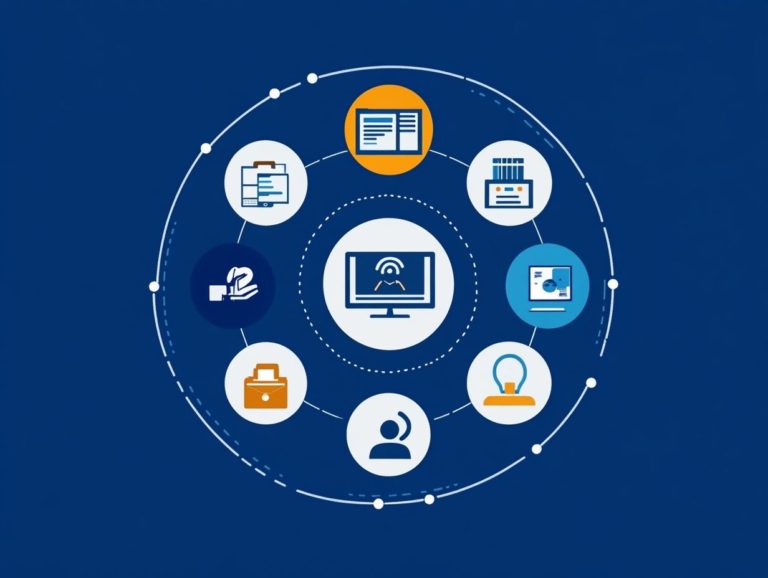Streamline Customer Support with CRM Integrations
In today s fast-paced business landscape, effective customer support is not just an option; it s essential for your success.
One powerful tool at your disposal is Customer Relationship Management (CRM), a system that helps businesses manage customer information and interactions. CRM integrations can revolutionize the way you engage with your clients, enhancing operational efficiency and elevating customer satisfaction.
Let s explore what CRM integrations are and why they matter. This article outlines their numerous benefits and provides insights into the different types available. You’ll discover how to choose and implement the right one for your business, along with key metrics to measure the success of your integration.
Prepare to harness the full potential of CRM integrations to streamline your customer support experience!
Contents
- Key Takeaways:
- Understanding CRM Integrations
- Benefits of CRM Integrations for Customer Support
- Types of CRM Integrations
- Choosing the Right CRM Integration for Your Business
- Implementing a CRM Integration
- Measuring the Success of Your CRM Integration
- Frequently Asked Questions
- 1. What is the purpose of streamlining customer support with CRM integrations?
- 2. How does CRM integration improve the customer support experience?
- 3. Can CRM integrations help with customer retention?
- 4. Is it possible to integrate multiple CRM systems for customer support?
- 5. How does CRM integration benefit customer support agents?
- 6. Which CRMs are commonly integrated for customer support?
Key Takeaways:

Streamline customer support by integrating CRM software with other business tools, such as helpdesk or communication platforms. Enjoy improved efficiency and customer satisfaction with CRM integrations to drive sales growth, as they provide a centralized system for managing customer interactions and data.
When choosing a CRM integration for your business, consider factors such as compatibility, customization options, and user-friendliness.
Understanding CRM Integrations
Grasping the nuances of CRM integrations is essential for any business looking to elevate customer service and refine operations. These integrations facilitate seamless communication among various platforms, enabling you to centralize customer interactions, automate processes, and effectively utilize real-time analytics.
By connecting CRM tools such as:
- Shape Software
- Intercom
- HubSpot CRM
- Engagebay
- Zoho CRM
- GIST
you can enhance customer experience and retention while improving response times and fostering collaboration across teams.
What is a CRM Integration?
A CRM integration is essentially the bridge that connects your customer relationship management system with other applications or services. This integration makes data flow effortlessly and elevates your customer service experience.
By harmonizing tools like email marketing platforms, customer support systems, and social media channels, this integration crafts a seamless experience for both you and your clients. The main goal of CRM integration is to centralize information, enabling your teams to access detailed customer histories and preferences.
This capability not only streamlines communication but also enhances your relationship management efforts. For example, an automated response system can initiate personalized email follow-ups after customer inquiries, ensuring that your interactions are both prompt and engaging.
Such efficiency boosts customer satisfaction and makes them feel valued and understood, ultimately nurturing their loyalty to your brand.
Benefits of CRM Integrations for Customer Support
The advantages of CRM software integrations for customer support are extensive, offering improved efficiency, heightened customer satisfaction, and streamlined ticket management processes. By utilizing CRM tools, your organization can handle customer feedback more effectively, enabling you to refine your offerings and elevate the overall customer experience.
With integration, your support teams gain access to real-time analytics, allowing them to monitor performance and response times closely. This ultimately enhances customer retention and fosters better collaboration within your team.
Improved Efficiency and Customer Satisfaction
Improved efficiency and customer satisfaction are essential outcomes when you integrate CRM systems into your customer support operations. By leveraging the best CRM integrations for communication tools, you can enjoy enhanced multi-channel support, allowing you to engage with customers seamlessly across various platforms.
This capability ensures a consistent experience and streamlines your communication processes. With access to centralized information, your teams can resolve inquiries more swiftly and accurately.
Streamlining your operations in this way reduces response times and minimizes frustration, ultimately leading to higher levels of customer satisfaction. When customers feel heard and valued, they re more likely to remain loyal, fostering enduring relationships that drive long-term business success.
Don’t miss out on transforming your customer support today! Start improving your customer support with custom CRM integrations.
Types of CRM Integrations

Explore the exciting variety of CRM integrations tailored to boost your business and enhance your capabilities!
Leading platforms like Shape Software, Intercom, HubSpot CRM, Engagebay, Zoho CRM, and GIST offer unique integration features. These tools empower you to optimize customer interactions and improve operational efficiency.
Popular CRM Platforms and Their Integrations
Popular CRM platforms such as Intercom, HubSpot, Engagebay, and Zoho provide powerful integrations that elevate your business operations and enhance customer service.
These systems seamlessly connect with various tools, including email marketing services, project management applications, and analytics platforms. This connectivity enables you to maintain a cohesive workflow.
For instance, integrating HubSpot with Mailchimp allows you to effortlessly synchronize contacts and streamline your email campaigns.
Intercom s chat features can be paired with helpdesk software, leading to quicker and more efficient support responses.
With Engagebay, you gain the advantage of real-time engagement tracking, significantly enhancing your customer management.
Similarly, Zoho’s versatile ecosystem supports a wide array of third-party applications, promoting better communication and operational efficiency across your teams and departments.
Choosing the Right CRM Integration for Your Business
Choosing the right CRM integration is vital! It can significantly boost your customer service and streamline your operations, as highlighted in the benefits of CRM API integrations.
With countless options available, you must evaluate carefully to find the perfect CRM integration that suits your needs.
Consider your specific needs and the features offered by various platforms. Ensure they align with your overall business objectives.
By applying best practices throughout this selection process, you can confidently choose the most effective CRM integration that enhances customer interaction and fosters collaboration.
Factors to Consider and Best Practices
When selecting a CRM integration, weigh various factors, including customer feedback mechanisms and optimizing response times.
Understanding your specific business needs is paramount. Assess how the integration aligns with your existing processes and objectives.
User experience is equally important. Intuitive navigation and accessibility can significantly boost team adoption and overall efficiency.
Don t overlook how well the integration works with your current software solutions to ensure seamless information flow.
Adhering to best practices for implementation is key. Provide thorough training for all users and conduct regular feedback sessions to adapt the system as needed.
Establish clear metrics for monitoring success, such as customer satisfaction ratings and productivity levels. This will help evaluate the integration’s effectiveness over time.
Implementing a CRM Integration
Implementing a CRM integration is essential for enhancing your customer service and streamlining your business operations. This process requires meticulous planning, precise execution, and continuous monitoring to ensure everything goes smoothly.
By leveraging collaboration tools and proactively addressing potential troubleshooting issues, you can unlock the full potential of your CRM system. This ensures it delivers maximum benefits for your organization.
Step-by-Step Guide and Troubleshooting Tips

Implementing a CRM integration is a carefully crafted journey that unfolds through several critical phases: planning, execution, and testing.
In the planning phase, you’ll want to define clear objectives and gather insights from all stakeholders. This ensures that everyone s needs are thoughtfully addressed.
Next comes the execution phase, where the focus shifts to aligning your current processes with the chosen CRM system. Achieve seamless data transfer and configure the system to meet your unique business requirements.
Thorough testing is essential; it’s your chance to verify that the integration operates smoothly and meets your criteria.
To effectively navigate common challenges like data mismatches or system errors, embrace proactive troubleshooting. Real-time monitoring and user feedback will help refine the process and elevate overall performance.
Measuring the Success of Your CRM Integration
Measuring the success of your CRM integration is crucial for grasping its influence on customer service and overall business performance.
By diving into key metrics like customer satisfaction, response time, and support ticket resolution rates, you can evaluate the effectiveness of your CRM strategies and make informed adjustments as needed.
This proactive approach not only enhances customer experiences but also drives your business forward.
Key Metrics to Track and Analyze
When integrating a Customer Relationship Management (CRM) system, it s essential to track and analyze key metrics such as customer feedback scores, response times, and ticket resolution efficiency. By keeping a close watch on these indicators, you can uncover valuable insights into both customer satisfaction and operational effectiveness.
Customer feedback scores reveal areas where your service excels or needs improvement. This allows your team to swiftly address any gaps.
Meanwhile, monitoring response times provides a clear picture of your support team s efficiency, ensuring that clients receive the timely assistance they expect. Ticket resolution efficiency is equally important, as it reflects your ability to resolve issues promptly while minimizing customer frustration.
To effectively analyze these metrics, consider employing tools that facilitate real-time tracking and generate comprehensive reports. Using these tools encourages ongoing improvement. Your organization can enhance its performance consistently.
Frequently Asked Questions
1. What is the purpose of streamlining customer support with CRM integrations?
Streamlining customer support with CRM integrations helps businesses improve their customer service by allowing them to gather, manage, and analyze customer data in one central location. This makes it easier to resolve customer issues and provide personalized support!
2. How does CRM integration improve the customer support experience?

With CRM integration, customer support teams can find all customer information in one spot, making it easier to understand their needs and provide efficient, personalized support.
3. Can CRM integrations help with customer retention?
Yes! By streamlining customer support, businesses can enhance the customer experience, leading to increased customer satisfaction and retention. The ability to track customer interactions and provide proactive support also helps retain customers.
4. Is it possible to integrate multiple CRM systems for customer support?
Yes, it is possible to integrate multiple CRM systems to streamline customer support. This is particularly useful for businesses that use different CRMs for different departments or regions, as it allows for a unified view of customer data.
5. How does CRM integration benefit customer support agents?
CRM integration simplifies customer support processes for agents by providing them with a comprehensive view of customer data. This saves time and effort, allowing them to focus on resolving customer issues and enhancing user experience through CRM integrations while providing personalized support.
6. Which CRMs are commonly integrated for customer support?
Some popular CRMs that are commonly integrated for customer support include Salesforce, HubSpot, Zoho, and Freshworks. However, most CRM systems offer integration capabilities, so it is best to check with your preferred CRM provider.






